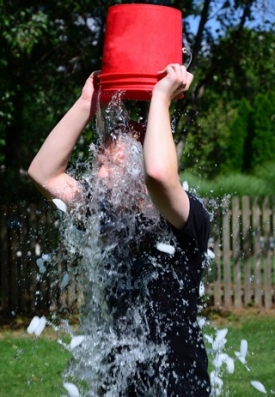ALS Ice Bucket Challenge Leads To Breakthroughs

By Celeste Beley
How many of you spent last summer dumping a bucket of ice water over your head all in the name of charity? While most participants did donate to the cause, as well as take the frigid challenge, skeptics had a whole different take on the event as they wondered how ice water could actually make a difference. A year later and their questions are answered: money donated to the ALS Foundation has allowed researchers to work faster and more diligently so that a treatment may be as close as two to three years away.
Estimates state that the ALS Foundation received about 115 million dollars in donations in 2014, most of which went to medical research and treatment. Jonathan Ling, a researcher at Johns Hopkins University, explained that the funding went to an experiment focused on faults in TDP-43 (a protein that decodes DNA when it’s functioning correctly), and specifically examining neurons in the brains of ALS patients. In mouse stem cell experiments, after restoration of TPD-43, damaged and dying cells were shown to come “back to life,” and “looked completely normal,” wrote Ling.
“With any luck this could lead to possibly a cure or really just slowing down this terrible disease,” said Ling. Ling personally addressed the critics who doubted the Ice Bucket Challenge as a stunt, stating “All of your donations have been amazingly helpful and we have been working tirelessly to find a cure. With the amount of money that the ice bucket challenge raised, I feel that there’s a lot of hope and optimism now for real, meaningful therapies.”

The ALS Association is equally thankful and hopeful that continued discoveries will be fueled by participating in the Ice Bucket Challenge. In addition to research, the ALS Association uses a portion of the donations for direct support of patients in need, in rural and underserved areas in particular. This support can include home health care, wheelchairs, special vehicles and breathing apparatuses.
Discussion Questions
- Did you take the ALS Ice Bucket Challenge? Why or why not? Do you think it could help find a cure?
